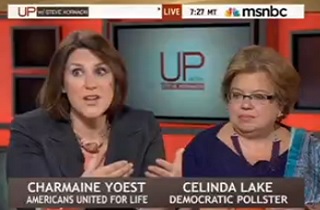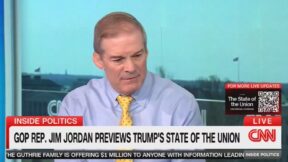Anti-Choice Activist Completely Steamrolls Up with Steve Kornacki
 Saturday morning cable news viewers looking for a few solid blocks of unadulterated anti-choice talking points may have found themselves tuned in to the wrong network this morning, as MSNBC’s Up with Steve Kornacki was the unlikely site of just such a spectacle. Charmaine Yoest, President and CEO of Americans United for Life, completely dominated her segments, and threw more junk past the host, and panel, than Gaylord Perry with a Vaseline hat. The walk-off pitch was a whopper worthy of Michele Bachmann.
Saturday morning cable news viewers looking for a few solid blocks of unadulterated anti-choice talking points may have found themselves tuned in to the wrong network this morning, as MSNBC’s Up with Steve Kornacki was the unlikely site of just such a spectacle. Charmaine Yoest, President and CEO of Americans United for Life, completely dominated her segments, and threw more junk past the host, and panel, than Gaylord Perry with a Vaseline hat. The walk-off pitch was a whopper worthy of Michele Bachmann.
The segments were pegged to the issue of reproductive rights, as brought to the fore this week by Rep. Trent Franks‘ (R-AZ) remarks on rape, and featured an abortion rights activist-free panel that included The Guardian‘s Ana Marie Cox, Democratic pollster Celinda Lake, and strategist L. Joy Williams. The logic behind these bookings is defensible since the theme of the segments was to be the politics, not the policy, of reproductive rights. The flaw in the booking strategy quickly became apparent.
This study in asymmetrical warfare began relatively quietly, with host Steve Kornacki immediately conceding the language of reproductive freedom by introducing Yoest as “pro-life,” and Yoest further conditioning her new friends to characterize opposition to reproductive freedom in the same way, while peppering her patter with phrases like “the most pro-abortion president,” and “Big Abortion,” and “the abortion lobby,” without a blink from the rest of the gang.
This is not a knock on Yoest, she was doing her job, but then it was someone else’s job to point out that none of these phrases are accurate. My side has its own euphemisms, like the “anti-choice” label in my headline, or “reproductive freedom,” which I would contend is 100% accurate, but from an objective standpoint, the main issue here is abortion rights. Abortion rights proponents, like President Obama, are not “pro-abortion,” we all believe in preventing abortions through the use of things like contraception and sex education. We are also not “anti-life,” which is the converse of “pro-life.” Neutral, non-fight-starting term”s like “pro abortion rights” and “anti-abortion rights” could easily have been used by the host, and set the tone for the conversation.
Instead, what viewers got was an emboldened Charmaine Yoest, who asserted that “this president has really, really overreached on the abortion issue. His positions are so radical, and so aggressively pro-abortion, that he’s alienating large swaths of the American public.”
Luckily, there was a whole room full of liberals to point out that, just in the past few weeks, the President has fought tooth-and-nail to keep Plan B away from teenagers, or that he blew Mitt Romney* away with women voters.
Or, Ana Marie Cox could completely accept the premise by saying “He’s not alienating anyone he has not already alienated.”
Having already adopted the “pro-life” language, Cox then took it to eleven by validating the frame. “When you’re talking about something like life,” she said, not “abortion rights” or “reproductive freedom” or “life as it relates to the breeding vessel,” but “life.”
“When you’re talking about something like life, it’s hard to say overreach, because if you believe that abortion is wrong, you’re not overreaching when you do anything to stop it, so I want to respect — I don’t want to call what these legislatures are doing necessarily overreach,” she said.
I’d like to hear anyone say that while they’re trying to look away from their Clockwork Orange forced-ultrasound screen. Yoest appreciated the assist. “I like your differentiation about what is overreaching and what is not,” she said, and why wouldn’t she? According to Cox, nothing is an overreach.
It just got worse from there. Yoest wondered why both sides can’t agree on laws making sex-selective abortions illegal, and Kornacki responded that such a law would produce a requirement that women and doctors provide proof for the reason for termination, a violation of privacy and an impossible burden to meet. Oh, wait, no he didn’t, he tossed to commercial and never went back to it.
After the break, L. Joy Williams finally got some words in edgewise, and held a Reproductive Rights 101 class in which she re-framed it as an issue of choice, which should have been done ten minutes earlier. Yoest wasn’t done, though, talking about “informed choice,” and the “indisputable” evidence that “abortion harms women, and the long-term effects of abortion.”
Williams again put up a good fight, telling Yoest that it’s “not indisputable,” and adding that “The legislation that’s being proposed and passed is not making sure that she has all of the information, it’s make sure she can see this on the screen,” and that informed choices should be made with “medically accurate information.”
After a brief rally in this segment, though, things went completely to hell in the third (yes, third) segment of this. Yoest begins by asserting that “The biggest abortion provider in our country gets over $1 million of taxpayer subsidy a day,” a properly-parsed (if misleading) sentence that leads to this sleight-of-hand: “This offends people when we are in the middle of a huge economic crisis in this country, when people are out of work, and see their tax dollars going for abortion.”
Host Steve Kornacki then cut in to remind Yoest that taxpayer funding for abortion is double-triple-illegal. Oh, wait, no, he didn’t, he cited poll numbers that show Americans oppose de-funding Planned Parenthood. As Yoest made the assertion three more times, Celinda Lake did manage to point out that “The tax dollars go for birth control to prevent abortions.”
But the coup de grace was right at the end, when Kornacki asks about the Obama administration’s decision to drop its appeal of the Plan B decision. “It is very, very clear that it is a potent drug, and that it has life-ending properties, and that information is not getting out there to young people.”
Now, anyone clued in to Yoest’s pro-life movement might divine the intent of the phrase “life-ending properties,” but to the average person, it sounds like she’s saying that Plan B can kill you. In fact, it is less dangerous than Advil, and doesn’t even end the so-called “life” that Yoest is referring to. Plan B simply prevents a fertilized egg (what Yoest calls “life”) from implanting in the uterus, but that egg is just as “alive” after it misses its date with the uterus as before.
This is a serious matter, because disseminating medically false or ambiguous information can actually be harmful to viewers. Someone, especially the host, should have corrected and clarified Yoest’s statement, but no one did.
Up has always had a vibe that eschews cheap slap-fighting in favor of good-faith conversation, but there was always some way to correct course when a guest din’t get the memo. Cox told me, via Twitter, that she was trying to be respectful (you can see our whole conversation on her feed), but I’ve seen Chris Hayes freeze talking point BS in its tracks without being a dick about it. It can be done, and when a good portion of your audience expects a good-faith, fact-based conversation, it should be done. When it comes to letting your audience think that Plan B might kill you, it must be done.
*Mitt Romney was the Republican candidate for president in 2012.
This is an opinion piece. The views expressed in this article are those of just the author.
New: The Mediaite One-Sheet "Newsletter of Newsletters"
Your daily summary and analysis of what the many, many media newsletters are saying and reporting. Subscribe now!






Comments
↓ Scroll down for comments ↓